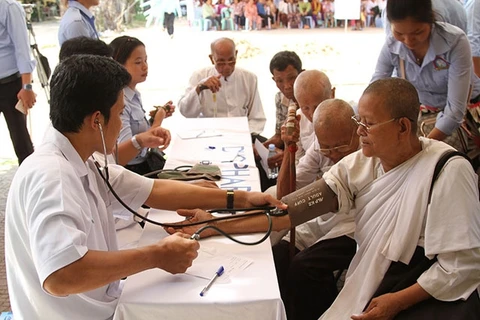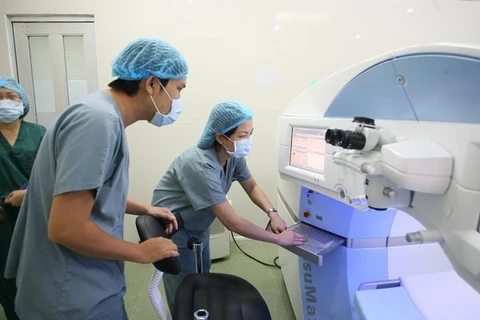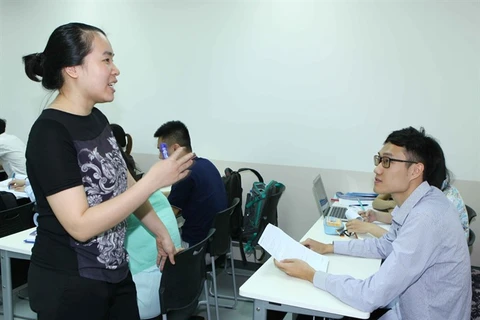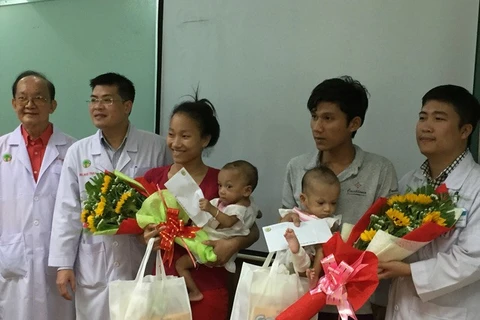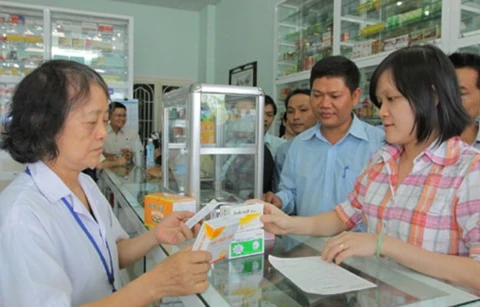Hanoi (VNS/VNA) - Unlike many medical graduates who want to work in big cities like Hanoi, Nguyen Chien Quyet, from the northern province of Hung Yen, chose to work in northern mountainous areas to help the disadvantaged people living there.
“I just think that it will be difficult for me to wholeheartedly care for people in mountainous regions once I’m married,” he said.
Three years ago when he was a final-year student, he heard about a project sending doctors to disadvantaged areas, including mountainous regions, border areas and islands. After nights agonising over his decision, he decided to sign up after getting approval from his relatives.
Quyet was among the first seven doctors chosen to go to poor districts in northern Lao Cai, Son La, Bac Kan and Dien Bien provinces.
After being trained for two years as a surgeon, the 28-year-old was assigned to Bac Ha General Hospital in the northern mountainous province of Lao Cai in July this year.
Spanning 68,000sq.m, Bac Ha has a population of about 64,000 people, with ethnic minorities making up 85 percent of the population.
The district struggles to meet demand for health care in the area, with just 40 doctors working in the district, meaning on average 6.6 doctors care for every 10,000 residents. The difficult terrain makes treatment even harder.
Nguyen Nhu Tuan, deputy director of Bac Ha General Hospital, said despite being located in a mountainous district, the hospital treated people from three districts, namely Bac Ha, Xin Man and Si Ma Cai. As a result, it was always packed with patients.
The surgery department, which he leads, is often overloaded.
The department has 50 beds but there are only two surgeons and because the other surgeon is on a training programme, he had to work alone.
"There are days, I have to perform 4-6 surgeries. I have to conduct one operation after the other despite the fact that I feel tired. My legs feel numb after standing for such a long time,” Tuan told online Vietnamplus newspaper.
Tuan said he believed that Quyet would share his burden and help the department deal with cases that used to be transferred to central hospitals.
"The hospital has been equipped with machines for endoscopic surgery for the past three years but they are rarely used due to a lack of doctors. We’re sure that more surgeries will be conducted with these facilities,” he said.
Nguyen Kim Phuong, director of the hospital, said despite being upgraded, the hospital was always short of doctors.
“This is the first time in a decade the hospital has received a young doctor to work,” he said, adding that he hoped that Quyet could help the hospital use more advanced technology.
Recalling his first days at Bac Ha Hospital, Quyet said: “It rained all day and night in the first week, deepening the nostalgia in my mind. The change in working environment and the quiet in Bac Ha District also made me feel uneasy.”
Quyet said he barely left the hospital in the first week. In the morning, he examined patients and conducted surgeries in the afternoon. In the evening he wandered around patient’s rooms.
"As I live alone and I’m not used to everything here, I went to patients’ rooms to chat with them to ease my loneliness and monitor their condition,” he said.
Before long he started feeling at home, with work keeping him busy all day with examinations and surgery, with an average day featuring up to four surgeries.
"I thought life would be slower in a mountainous area. Unbelievably, time passes quickly at my pace of work. Everything seems to have happened so fast, but I’ve only been here two months,” he said.
Quyet said he would never forget the first endoscopic surgery on Sung Seo Sau, a Mong ethnic person from Bac Ha district’s Nam Mon commune.
At about 5:30pm, a staff member rushed to his room announcing that a patient suffering appendicitis needed surgery immediately.
He saw the middle-aged man lying on bed with his arms clutching his abdomen, with his mouth tightly shut as if he was trying to withstand the pain. After examining the patient, Quyet operated on him, finishing in about 40 minutes.
Sung Seo Ky’s, the patient’s son, said he was surprised by the way the doctor performed the surgery.
"I have met some people with appendicitis but the way doctors conduct surgery for my father is unusual,” he said.
Others who had undergone the procedure were left with a long abdominal scar but miraculously, Sau was left with just three spots, Ky said.
Pham Van Tac, head of the Ministry of Health’s Organisation and Personnel Department, said the project sending young doctors to poor districts and island areas was approved by the Ministry of Health in March 2013.
It aims to help the needy access better medical services, reduce unnecessary transfers of patients to higher-level hospitals and ease overloading at central hospitals.
Under the project, young doctors who perform well in medical universities and volunteer to join will be chosen.
After being trained for two years in a speciality, the male ones will be taken to districts hospital in poor areas for three years, and female doctors for two years.
It is expected that between 300 and 500 doctors will be sent to disadvantaged areas to help alleviate the shortage in human resources.-VNA
VNA

